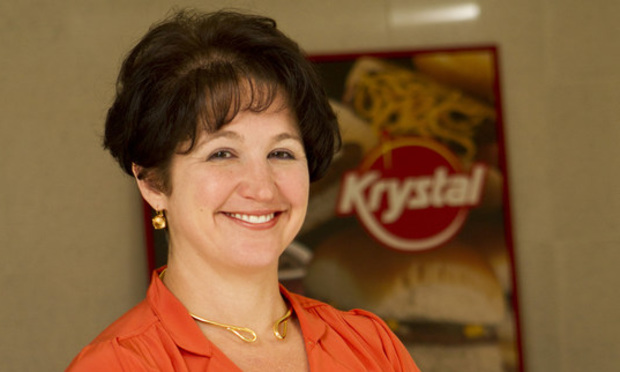CLO Who Passed 5 Bar Exams in 3 Years Speaks Up for Relocating Military Spouse Lawyers
Sloane Perras, senior vice president and chief administrative and legal officer at fast food restaurant chain The Krystal Co., signed onto an amicus brief urging the Georgia Supreme Court to overturn the state Board of Bar Examiners' denial of a military spouse's request to practice law without having to pass the state's bar exam.
September 20, 2018 at 02:14 PM
4 minute read
The original version of this story was published on Corporate Counsel
 Sloane Perras, SVP, chief administrative and legal officer, The Krystal Co. (Photo: John Disney/ALM)
Sloane Perras, SVP, chief administrative and legal officer, The Krystal Co. (Photo: John Disney/ALM)
In an era when top in-house attorneys have spoken out on issues from net neutrality to immigration, an Atlanta legal boss used her personal experience to advocate for attorneys who are military spouses.
Sloane Perras, senior vice president and chief administrative and legal officer at fast food restaurant chain The Krystal Co., signed onto an amicus brief urging the Georgia Supreme Court to overturn the state Board of Bar Examiners' denial of a military spouse's request to practice law without having to pass the Georgia bar exam.
And last week, the state high court did just that, ruling that the state bar erred when it denied, without giving a reason, a woman's waiver request based on her status as the spouse of an active member of the military who had been transferred to Georgia. More than 30 states have military spouse licensing accommodations for lawyers, and more than a dozen more are working on such efforts, according to the Military Spouse JD Network.
Like the woman in that case, Harriet O'Neal, Perras knows a thing or two about the hardships of being a military spouse while also seeking a legal career. While married to an active duty Air Force pilot, she worked a total of eight jobs between 2003 and 2009, according to the amicus brief, and passed five U.S. bar examinations all within three years of graduating law school due to military relocations.
Such relocations, Perras said, are more than a mere inconvenience.
“The reality of a bar exam only being offered twice a year, and you may be moving at a moment's notice, prevents effective job searching for a traditional position,” she said in an email. “As a result, you can become pigeon-holed as 'that contract lawyer' instead of the person you really are.”
The availability of a waiver like the one at issue in the Georgia Supreme Court case, however, allows military spouse lawyers to move “to the next meaningful step in [their] career more expeditiously, a critical element in avoiding the dreaded 'resume break' between jobs that can be a negative screening tool for prospective employers overwhelmed by submissions,” she added.
Perras said she became involved in the amicus effort at the request of Linda Klein, a partner at Baker, Donelson, Bearman, Caldwell & Berkowitz and immediate past-president of the American Bar Association. In that role, Klein created a program to provide veterans access to legal assistance, an experience that informed her of issues unique to military families.
Besides Klein and Perras, two other amici—former U.S. Navy officer and longtime securities litigator Oscar Persons and Baker Donelson partner and former general counsel at the U.S. Department of Homeland Security Joe Whitley—signed onto the brief to advocate for the constitutional mandate and necessity of a strong national defense and military.
Unlike other GCs and CLOs whose public advocacy has been directly related to their employers' business interests, Perras' involvement sprang from her personal experience. Nonetheless, she said that she received “100 percent” support from Krystal and its CEO, who encouraged Perras to participate in the effort.
“Like many franchisors, Krystal actively seeks military veterans as employees and franchisees to grow with us and start their own businesses, post military career,” she said.
In the O'Neal case, the justices remanded the matter to the bar. As of last week, it was reviewing the opinion, after which the board would decide how to proceed, the director said at the time.
This content has been archived. It is available through our partners, LexisNexis® and Bloomberg Law.
To view this content, please continue to their sites.
Not a Lexis Subscriber?
Subscribe Now
Not a Bloomberg Law Subscriber?
Subscribe Now
NOT FOR REPRINT
© 2025 ALM Global, LLC, All Rights Reserved. Request academic re-use from www.copyright.com. All other uses, submit a request to [email protected]. For more information visit Asset & Logo Licensing.
You Might Like
View All
COVID-19 Vaccine Suit Against United Airlines Hangs on Right-to-Sue Letter Date
3 minute read
Lavish 'Lies' Led to Investors Being Fleeced in Nine-Figure International Crypto Scam
3 minute read
Trending Stories
- 1Public Notices/Calendars
- 2Monday Newspaper
- 3Judicial Ethics Opinion 24-98
- 4'It's Not Going to Be Pretty': PayPal, Capital One Face Novel Class Actions Over 'Poaching' Commissions Owed Influencers
- 511th Circuit Rejects Trump's Emergency Request as DOJ Prepares to Release Special Counsel's Final Report
Who Got The Work
Michael G. Bongiorno, Andrew Scott Dulberg and Elizabeth E. Driscoll from Wilmer Cutler Pickering Hale and Dorr have stepped in to represent Symbotic Inc., an A.I.-enabled technology platform that focuses on increasing supply chain efficiency, and other defendants in a pending shareholder derivative lawsuit. The case, filed Oct. 2 in Massachusetts District Court by the Brown Law Firm on behalf of Stephen Austen, accuses certain officers and directors of misleading investors in regard to Symbotic's potential for margin growth by failing to disclose that the company was not equipped to timely deploy its systems or manage expenses through project delays. The case, assigned to U.S. District Judge Nathaniel M. Gorton, is 1:24-cv-12522, Austen v. Cohen et al.
Who Got The Work
Edmund Polubinski and Marie Killmond of Davis Polk & Wardwell have entered appearances for data platform software development company MongoDB and other defendants in a pending shareholder derivative lawsuit. The action, filed Oct. 7 in New York Southern District Court by the Brown Law Firm, accuses the company's directors and/or officers of falsely expressing confidence in the company’s restructuring of its sales incentive plan and downplaying the severity of decreases in its upfront commitments. The case is 1:24-cv-07594, Roy v. Ittycheria et al.
Who Got The Work
Amy O. Bruchs and Kurt F. Ellison of Michael Best & Friedrich have entered appearances for Epic Systems Corp. in a pending employment discrimination lawsuit. The suit was filed Sept. 7 in Wisconsin Western District Court by Levine Eisberner LLC and Siri & Glimstad on behalf of a project manager who claims that he was wrongfully terminated after applying for a religious exemption to the defendant's COVID-19 vaccine mandate. The case, assigned to U.S. Magistrate Judge Anita Marie Boor, is 3:24-cv-00630, Secker, Nathan v. Epic Systems Corporation.
Who Got The Work
David X. Sullivan, Thomas J. Finn and Gregory A. Hall from McCarter & English have entered appearances for Sunrun Installation Services in a pending civil rights lawsuit. The complaint was filed Sept. 4 in Connecticut District Court by attorney Robert M. Berke on behalf of former employee George Edward Steins, who was arrested and charged with employing an unregistered home improvement salesperson. The complaint alleges that had Sunrun informed the Connecticut Department of Consumer Protection that the plaintiff's employment had ended in 2017 and that he no longer held Sunrun's home improvement contractor license, he would not have been hit with charges, which were dismissed in May 2024. The case, assigned to U.S. District Judge Jeffrey A. Meyer, is 3:24-cv-01423, Steins v. Sunrun, Inc. et al.
Who Got The Work
Greenberg Traurig shareholder Joshua L. Raskin has entered an appearance for boohoo.com UK Ltd. in a pending patent infringement lawsuit. The suit, filed Sept. 3 in Texas Eastern District Court by Rozier Hardt McDonough on behalf of Alto Dynamics, asserts five patents related to an online shopping platform. The case, assigned to U.S. District Judge Rodney Gilstrap, is 2:24-cv-00719, Alto Dynamics, LLC v. boohoo.com UK Limited.
Featured Firms
Law Offices of Gary Martin Hays & Associates, P.C.
(470) 294-1674
Law Offices of Mark E. Salomone
(857) 444-6468
Smith & Hassler
(713) 739-1250









